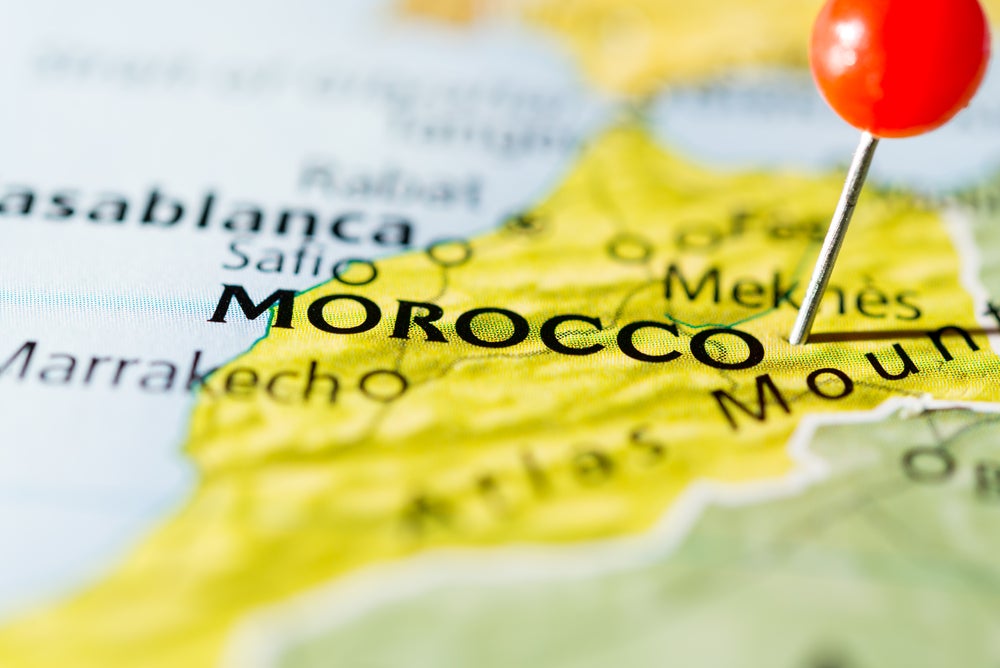Despite the abundance of battery materials in Africa, there are no gigafactories, – factories capable of producing batteries on a scale of more than one gigawatt-hour (GWh).
Morocco is trying to change this and is well-positioned to establish itself as a politically stable and inviting business environment. The highest battery demand will come from the automotive sector, which GlobalData expects to account for 80% of battery demand by 2035.
Morocco’s automotive industry is becoming increasingly significant and is a hotbed for investment in electric vehicle (EV) production and batteries. It is already home to Renault and Stellantis production plants, which have a combined capacity of 700,000 vehicles. Other plants are being opened to develop the EV battery manufacturing industry in Morocco, with Morocco’s Industry Minister Ryad Mezzour targeting annual production of one million vehicles by 2027 at the latest. Investment Monitor already reports that Morocco accounts for 2% of global automotive FDI projects. In addition, the US International Trade Administration believes that Morocco has high renewable energy potential.
Investment in batteries from abroad
As China looks to strengthen its upstream dominance in the battery industry, Western countries aim to undermine China’s ambitions to level the playing field. Many African countries rich in natural resources are open to Chinese investment, reducing the disruptive impact of any Western sanctions on China’s growth strategies. For the last decade, the flow of foreign direct investment in Africa from China has surpassed FDI from the US, with hundreds of billions of dollars’ worth of loans going to countries like the Democratic Republic of the Congo (DRC), Zambia, Ghana, and Zimbabwe.
Gotion High Tech is investing $6.4 billion to establish a new 100 gigawatt-hour EV battery manufacturing facility in the country. The Gotion plant would be one of only 13 factories globally with such production scale potential, cementing Morocco as a leader in Africa’s automotive industry. Mezzour hopes that Morocco will easily meet its 2025 goal of over 100,000 EVs produced annually, with further investment from Stellantis and other organizations expected to enhance these ambitions.
New material sources for batteries – with growing geopolitical stakes
In June 2023, lithium deposits were discovered near Morocco’s border with Mauritania. If the lithium reserves are significant, it could remove Morocco’s need to import the metal internationally and would support its growing renewable energy sector, as well as bolster its increasingly significant EV business. Alongside Free Trade Agreements with the US, EU, and other countries facilitating their exports, Morocco has notable manganese, cobalt, and phosphate resources, which are crucial elements of the lithium-ion battery supply chain.
Morocco can take advantage of Europe’s EV aspirations, with the continent’s proximity being advantageous, given the European Commission’s mandate to phase out all fossil-fuel vehicles in the European Union by 2035. 90% of Morocco’s automotive exports already go to Europe.
The need for geographic diversification
As supply pressures grow alongside the increasing demand for EVs, there will be a growing need for supply chain geographic diversification. A global battery shortage is a serious risk by 2025 due to a lack of investment in new critical mineral mines over the last five years. Additionally, most countries that are rich in critical minerals do not have refineries or factories that produce battery components.
Morocco could be a leader
Morocco, with its growing technical capacity supplied by domestic minerals, could be a model for success. It is well-positioned, strategically and geographically, to meet demand in Europe and the rest of Africa. Moving battery processing closer to the materials’ sources will also lower supply-chain emissions by reducing transportation. A regional network of African battery production facilities could support EV adoption in the continent, with the success of investment in Morocco potentially encouraging broader investment in similar projects throughout Africa.
Algeria is already trying to accelerate its gigafactory investment to spur its domestic industry. A strong regional battery supply chain in Africa will enhance the continent’s presence in the battery industry. If paired with the development of battery recycling, alongside research into new battery technologies and materials, a circular battery value chain in Africa is possible. The potential success of the Moroccan battery industry, thus, takes on continental significance.








